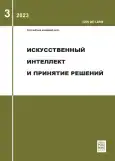Artificial Intelligence Researchers: Dissertation-Based Analysis
- 作者: Melekh N.V.1, Averyanov A.O.1, Gurtov V.A.1
-
隶属关系:
- Petrozavodsk State University
- 期: 编号 3 (2023)
- 页面: 109-122
- 栏目: Decision Analysis
- URL: https://journal-vniispk.ru/2071-8594/article/view/270354
- DOI: https://doi.org/10.14357/20718594230311
- ID: 270354
如何引用文章
全文:
详细
This article presents the results of compiling a list of dissertation studies defended for the degree of candidate of sciences for the period from 2016 to 2022, the topics of which relate to the artificial intelligence field (AI). A thematic analysis of these dissertations and characteristics of the community of candidates of science belonging to the category “Artificial Intelligence Researchers” are provided. The generated list of dissertations is structured by areas of artificial intelligence technologies and subtechnologies. It is shown that the training of highly qualified scientific personnel fully meets the needs of the artificial intelligence field in the category of "AI Researchers" on the short-term planning horizon. “AI Competence Centers” are identified according to the criterion of the number of dissertations completed in scientific and educational organizations on the AI subject.
全文:
作者简介
Natalya Melekh
Petrozavodsk State University
编辑信件的主要联系方式.
Email: natalie_melekh@mail.ru
Candidate of Physical and Mathematical Sciences. Senior researcher
俄罗斯联邦, PetrozavodskAlexander Averyanov
Petrozavodsk State University
Email: aver@petrsu.ru
Postgraduate student
俄罗斯联邦, PetrozavodskValery Gurtov
Petrozavodsk State University
Email: vgurt@psu.karelia.ru
Doctor of Physical and Mathematical Sciences, Professor. Direktor of the Budget monitoring center
俄罗斯联邦, Petrozavodsk参考
- Leksin V.N. Iskusstvennyy intellekt v ekonomike i politike nashego vremeni. Stat'ya 2. Iskusstvennyy intellekt kak tovar i usluga [Artificial intelligence in economy and policy nowadays. Article 2. Artificial intelligence as goods and service]. // Rossiyskiy ekonomicheskiy zhurnal [Russian Economics Journal]. 2020. No 5. P. 3–33.
- Sokolov I.A., Misharin A.S., Kupriyanovskiy V.P., Pokusaev O.N., Kupriyanovskaya Yu.V. Roboty, avtonomnye roboto-tekhnicheskie sistemy, iskusstvennyy intellekt i voprosy trans-formatsii rynka transportno-logisticheskikh uslug v usloviyakh tsifrovizatsii ekonomiki [Robots, autonomous robotic systems, artificial intelligence and the transformation of the market of transport and logistics services in the digitalization of the economy]. // International Journal of Open Information Technologies International. 2018. V. 6. No 4. P. 92–108.
- The AI Index 2022 Annual Report. Stanford University. 2022. 230 p.
- Analysis Report of the World's most influential AI Scholar (AI 2000) in 2022. 2022. 15 p.
- Pedró, F. et al. 2019. Artificial intelligence in education: challenges and opportunities for sustainable development. UNESCO. 46 p.
- Kostyukova K. S. Politika tsifrovoy transformatsiya Yaponii na primere razvitiya tekhnologii iskusstvennogo intellekta [Digital Transformation Policy in Japan: the Case of Artificial Intelligence] // MIR (Modernizatsiya. Innovatsii. Razvitie) [MIR (Modernization. Innovation. Research)]. 2019. V. 10 No 4. P. 516–529.
- Livshits V.N., Shatalova O.M., Dmitrieva O.V. Upravlyaemaya ekonomika: aktual'nye voprosy gosudarstvennogo upravleniya v usloviyakh tsifrovoy Transformatsii [Managed Economy: An Overview of Current Public Administration Practices in the Digital Transformation]. // Trudy ISA RAN [Proceedings of ISA RAS]. V. 71. No 4. P. 11–22.
- Babenko A., Slesarev A., Chigorin A., Lempitsky V. Neural codes for image retrieval. // Lecture Notes in Computer Science. 2014. V. 8689 LNCS. Part 1. Р. 584-599.
- Jumper J., Evans R., Pritzel A., Green T., Figurnov M., Ronneberger O. Highly accurate protein structure prediction with AlphaFold. // Nature. 2021. V 7873. No 596. Р. 583-589.
- Sokolov I.A. Teoriya i praktika primeneniya metodov iskusstvennogo intellekta [Theory and practice in artificial intelligence]. // Vestnik Rossiyskoy akademii nauk [Bulletin of the Russian Academy of Sciences]. 2019. V.89. No 4. P. 365-370.
- IT-kadry dlya tsifrovoy ekonomiki v Rossii. Otsenka chislennosti IT-spetsialistov v Rossii i prognoz potrebnosti v nikh do 2024 g. [IT personnel for the digital economy in Russia. Estimation of the number of IT specialists in Russia and forecast of the need for them until 2024] Assotsiatsiya APKIT, Moskva [APKIT Association, Moscow], 2020. 19 p.
- Aver'yanov A.O., Stepus' I.S., Gurtov V.A. Prognoz kadrovoy potrebnosti dlya sfery iskusstvennogo intellekta v Rossii [Forecast of staffing needs for the field of artificial intelligence in Russia] // Problemy prognozirovaniya [Forecasting problems]. 2023. No 1. P. 129-143.
- Gurtov V.A., Aver'yanov A.O., Korzun D.Zh., Smirnov N.V. Sistema klassifikatsii tekhnologiy v sfere iskusstvennogo intellekta dlya kadrovogo prognozirovaniya [A system for classification of technologies in the field of artificial intelligence for personnel forecasting]. // Ekonomicheskie i sotsial'nye peremeny: fakty, tendentsii, prognoz [Economic and Social Changes: Facts, Trends, Forecast]. 2022. V. 15. No 3. P. 113–133.
- Bukhanovskiy A.V. Natsional'nyy tsentr kognitivnykh razrabotok (tsentr kompetentsiy NTI): iskusstvennyy intellekt na sluzhbe professional'noy deyatel'nosti [National Center for Cognitive Research: artificial intelligence in the service of professional activity]. // Innovatsii [Innovations]. 2019. V. 253. No 11. P. 105–111.
- Gurtov V.A., Stasevich A.V. Tsentry kompetentsii v sfere arkticheskikh issledovaniy: analiz na osnove dissertatsionnykh rabot [Competence centers for Arctic studies: thesis-based analysis]. // Arktika i Sever [Arctic and North]. 2020. No 38. P. 6–19.
补充文件









